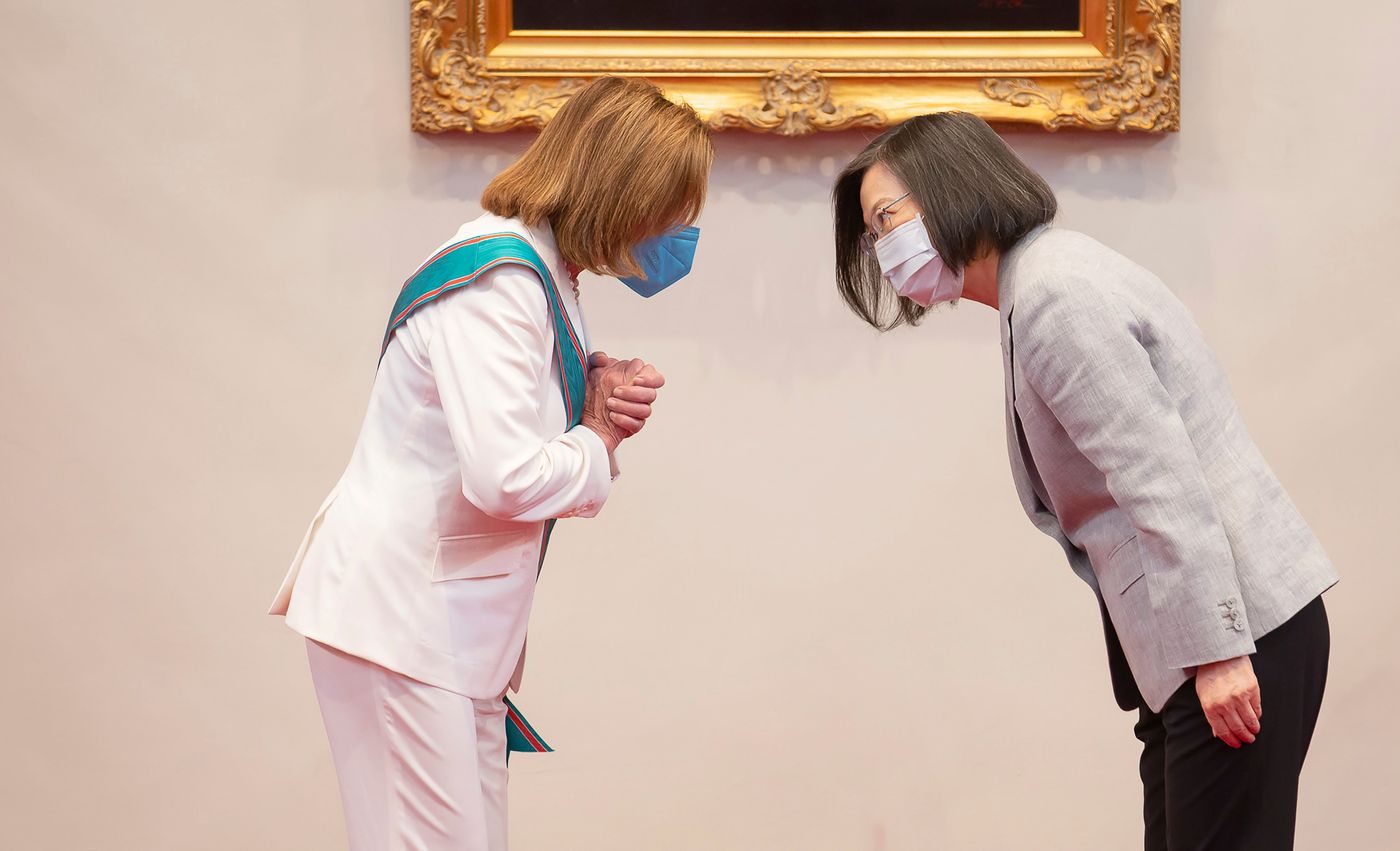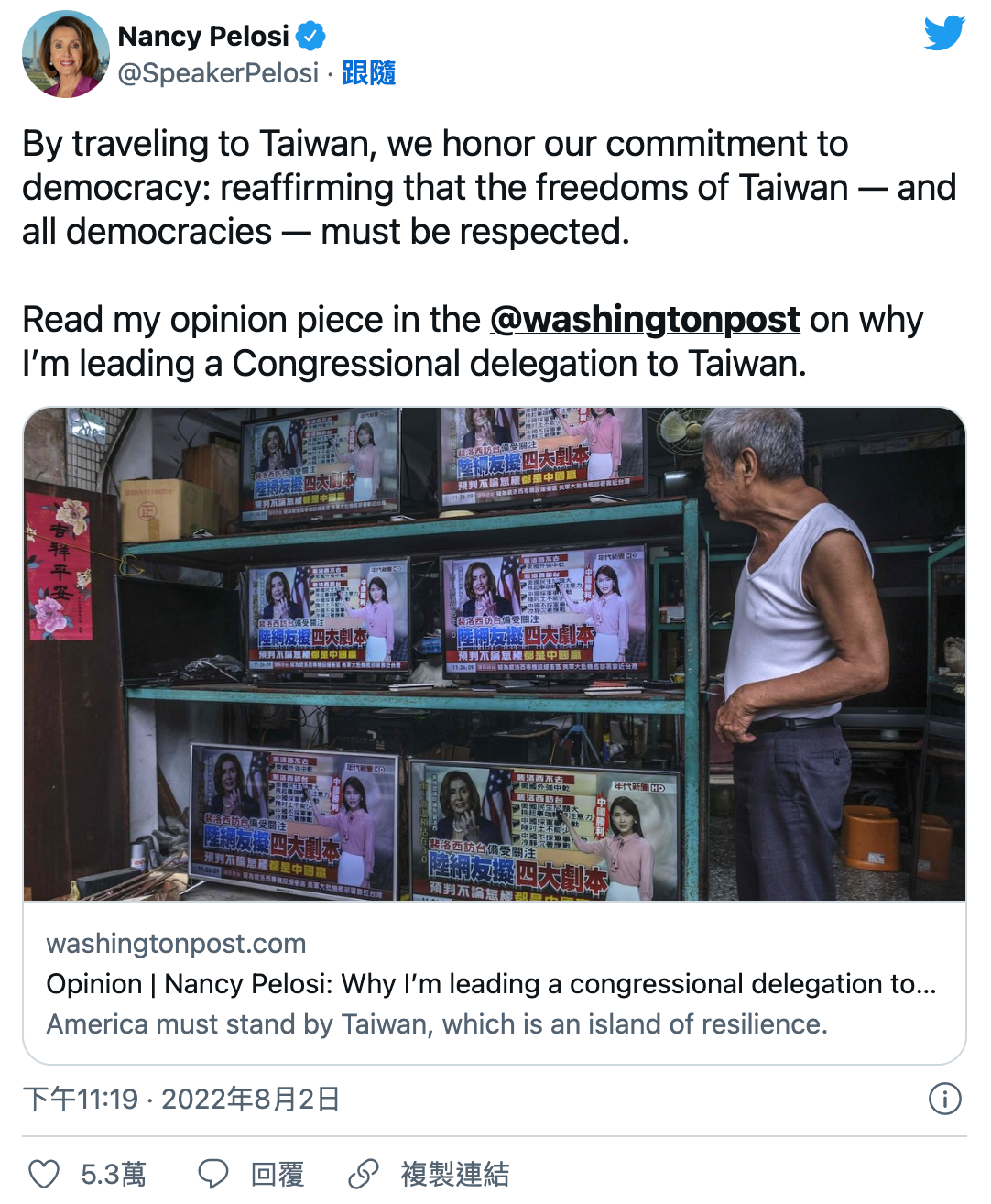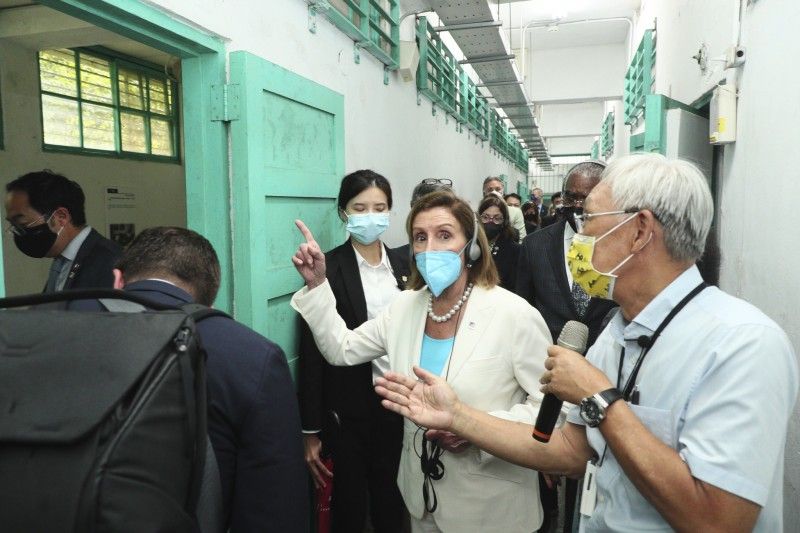
世界走走|她的故事與妳同行
186 | Zhao Sile commented on Pelosi's visit to Taiwan: Ming Xiu three plank roads, secretly crossing three Chencang

By Zhao Sile (Poli Sci PhD student @UCSD. Former journalist and author on Chinese politics and social movement.) (Original post published on August 4, 2022)
In addition to these three major points, Pelosi's visit to Taiwan has three hidden intentions: to reassure Taiwan's wafer industry, to add points to the Democratic Party and herself at the domestic political level in the United States, and to inspire Taiwan's society to face military threats.
This article will combine Pelosi's public speech, itinerary, and the political situation in the United States and the world to interpret Pelosi's public information on her trip to Taiwan, and how she skillfully "passes through" for the three hidden agendas.
Ming Plank Road: Security, Democracy, Human Rights
First of all, in terms of security , Pelosi's visit to Taiwan is part of the Asia-Pacific trip she leads a congressional delegation. Other visiting countries include South Korea, Singapore, etc. The core topic of this trip is "mutual security" .
In her "Washington Post" letter explaining the purpose of her visit to Taiwan, Pelosi pointed out that in addition to reaffirming the United States' support for Taiwan, the focus of her dialogue with Taiwan lies in the common interests of both parties: promoting openness and freedom in the Indo-Pacific region- This goal echoes Biden's recent trip to Asia to launch the Indo-Pacific Economic Framework (IPEF).
IPEF is not a traditional economic and trade agreement, does not reduce tariffs, but focuses on strengthening economic security and trust between the United States and Indo-Pacific countries. Economic influence and security threats. The Washington policy community regrets that the IPEF has not been included in Taiwan, but this is also inevitable due to Taiwan's limited international status.
Pelosi's trip can be said to be compensation for Taiwan: Although not a full member of the IPEF, Taiwan is an important part of the U.S. Indo-Pacific strategy, the security and openness that the U.S. seeks in the Indo-Pacific, including Taiwan. This can be said to go beyond the trilateral framework between Taiwan, the United States and China, and means that Taiwan is part of the international security order. Taiwan's diplomatic community should be moved and encouraged by this.

Regarding democracy , Pelosi clearly defined the background of this visit to Taiwan as "the world is facing a choice between democracy and autocracy", and praised Taiwan's democratic values.
The framework of "democracy vs. autocracy" is the theme of the Biden administration's foreign policy. From his visit to Europe at the beginning of his term, to the Democracy Summit at the end of last year, and to the Americas Summit last month, Biden has tried his best to persuade countries around the world to choose "democracy" under this issue, but the results are at best mixed. Europe held the line in the Russo-Ukrainian war, but several key American leaders boycotted the Americas summit because they disagreed with the "democracy vs. autocracy" line.
Pelosi's trip to Taiwan has not only successfully attracted the attention of the world's media, but also achieved good results with the unanimous and enthusiastic response of Taiwan officials and people.
The reason why the theme of human rights is particularly prominent in this trip is largely supported by Pelosi's more than three decades of political experience. Pelosi's support for issues related to democracy and human rights in China has remained unchanged since the Tiananmen Square Incident in 1989. From the permanent residency law for persecuted students after the June 4th Movement, to the promotion of related laws in Hong Kong in recent years, Pelosi's role is crucial.
During this hasty trip to Taiwan, she also set aside a large period of time to visit the Jingmei Human Rights Park, sat in the military court and listened to Chen Ju's story of the persecution of Taiwanese, and met with Lin Rongji, Li Mingzhe and other human rights violations by the CCP in recent years. victims. Chinese, Hong Kong, Taiwan, Uighur and Tibetan activists in the United States all know that they have two most reliable allies in Congress: Democrat Pelosi and Republican Marco Rubio.

Among them, Pelosi's position in the party is even more prominent, so her lasting attention is extremely precious. In addition to explaining the importance of Taiwan to the United States, Pelosi's widely-received letter to the China Post has repeatedly described the CCP's persecution of Hong Kong, Uyghurs and Tibetans, which shows her sincere dedication to human rights issues. care.
However, any major diplomatic act will not be at a single level. In addition to high-profile advocacy of internationally recognized values such as security, democracy and human rights, Pelosi's trip to Taiwan also has a practical side.
Dark Chen Cang: Stabilize the Chip Supply Chain, Improve the Democratic Party and Individual Diplomatic Achievements, Encourage Taiwan to Face the Military Threat
...
[This article is not over, see "Walking the World" for the full text: Zhao Sile commented on Pelosi's visit to Taiwan: Ming Xiu three plank roads, secretly crossing three Chencang ]
176. An Abe, each statement: "supporter" or "destroyer" of democratic peace?
177. "The uterus and vagina are 3D!": The 18-year revolution of menstruation leader Vanessa
179. Sun Xiaojiao column: Will there be hip-hop in China in 2022? When a rapper sings a patriotic theme
180. Sidenotes of Cross-Border Dialogue: What Will the U.S. Uterine War Change?
183. Remember them: 4 pro-democracy activists executed in Myanmar coup
186. Zhao Sile's Commentary on Pelosi's Visit to Taiwan: Building Three Plank Roads in the Ming Dynasty
"World Walk" is a new start-up and hopes to become a gender-conscious international news media. It hopes to interpret fascinating stories from all over the world from a new perspective that escapes dualism 🌎
From now on, we will continue to meet you in " World Walk Sehseh.world ". In the future, in-depth articles will only be published in the new station. Evening News, Weekly News and Handbook will continue to be sent on Matters. Click the link below to subscribe to the e-newsletter, and don’t miss the wonderful articles 💕
Like my work?
Don't forget to support or like, so I know you are with me..
Comment…